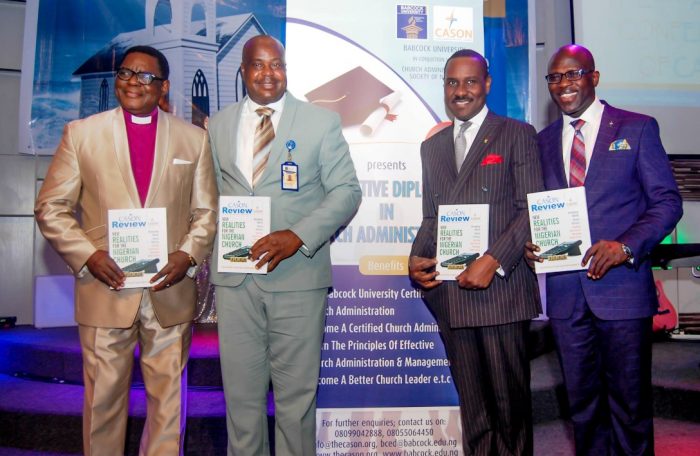The Church Administrators Society of Nigeria (CASON) has announced the need for churches in Nigeria to comply with the laws of the land regarding proper accountability, otherwise risk the penalties of non-compliance.
CASON also announced its new partnership with Babcock University, Ilishan, Ogun State, to commence registration for 2017/2018 Executive Diploma in Church Administration – first of its kind in Nigeria.
This is coming in the wake of the economic depression that plagued the country in recent years and new regulations that the federal government has just signed into law, which would have far reaching effects on how churches and charities are run, once made effective with the Financial Reporting Council of Nigeria (FRC) as government watchdog.
Speaking at CASON’s fourth annual conference Monday in Lagos, the President, Pastor Seyi Oladimeji noted that recent economic and political realities have brought changes into the country, which churches must be seen to respond to positively.
He said, “This year’s conference is aimed at preparing churches to respond properly to the changes in our nation. We are the solution; we cannot afford to become part of the problem! It is The Church that should set the pace for societal transformation.”
Announcing details of the CASON/Babcock University pact, Oladimeji said, “I announce with joy the birth of an Executive Diploma course in Church Administration in collaboration with Babcock University. This Diploma when obtained can be used to study MBA in Church Administration. This is a major step to further train professional church administrators who will help position the Nigerian Church for end time exploits.
“If churches are better self-regulated, we would not need to be externally supervised by any government agencies. That is why CASON as a body has organized this year’s conference to discuss compliance with government rules and regulation concerning NGOs and NFPOs” Oladimeji said.
Presenting a paper at the conference as keynote speaker titled “Recession, Whistleblowing and New Realities for the Nigerian Church”, Pastor Ituah Ighodalo, a chartered accountant and Senior Pastor, Trinity House, noted that so many financial mishaps have been foisted on the country through bad leadership and “unfortunately, the Church must also share in some of the blame for the near truncation of the Nigerian dream.
“We have failed to set the right examples in the areas of openness, transparency and accountability. The Nigerian Church has indeed become a mirror-reflection of the country itself – with all its ills and missteps. The Church itself is not free of corrupt practices and within the church, resources may be threatened by graft, inefficiency and personnel misbehavior.
“This is a call for more incisive and focused liturgy from the pulpit. The Church must go back to the Bible – the basics. The Church must go beyond the traditional methods of doing things, they must be precise, scientific and able to put measures in place that will not allow anyone to launder money through them or use proceeds from ill gotten wealth or graft to fund church activities.”
Also speaking at the conference, Elder Segun Shelleh, another chartered accountant and Member of the CASON Governing Council, highlighted old and new federal government laws and policies that the Nigerian Church needs to be aware of and guide itself against the consequences of non-compliance and default.
He listed among other requirements, compliance with the money laundering act and filing of annual returns to the Corporate Affairs Commission as vital areas of compliance, adding that churches are “now required to have and submit a certificate of incorporation, constitution, foreign currency receipts and transactions in excess of $1000 or N5 million (local) as well as conduct a Know Your Customer (KYC) for all members who give financially in church.
Shelleh explained the distinction between church incomes that are taxable and the ones that are not under the Companies Income Tax Act (CITA) as amended and Federal Inland Revenue Service (FIRS).



Leave a Reply